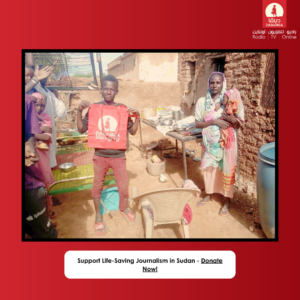‘Sudan govt. should remove all press restrictions’
The International Federation for Human Rights (FIDH) and the African Centre for Justice and Peace Studies (ACJPS) are deeply concerned about increasing restrictions on the freedom of expression, and in particular press freedoms, in Sudan. They urge the Sudanese government for the “amendment of all laws and practices that restrict the right to freedom of expression in Sudan”.
The International Federation for Human Rights (FIDH) and the African Centre for Justice and Peace Studies (ACJPS) are deeply concerned about increasing restrictions on the freedom of expression, and in particular press freedoms, in Sudan. They urge the Sudanese government for the “amendment of all laws and practices that restrict the right to freedom of expression in Sudan”.
These restrictions have severely limited the availability of independent and reliable information at a critical time in the history of Sudan, the ACJPS and FIDH reported in an oral statement in Gambia on 10 November, during the 57th session of the African Commission on Human and Peoples’ Rights.
Both organisations state that the Sudanese government has increased its reliance on the National Intelligence and Security Services (NISS), using its broad powers of arrest and detention, search and seizure, under the National Security Act of 2010, to censor print and online media.
Journalists have been subjected to repeated summonses and threats of prosecution, arbitrary detention, blacklisting and other forms of harassment such threatening visits or telephone calls from the NISS ordering them not to report on so-called “red line” issues.
Journalists and outspoken activists have also been targeted for arbitrary arrest, detention, ill-treatment and torture, the joint statement reads.
Post-print censorship, whereby entire print runs of daily editions are confiscated prior to morning distribution, is increasingly used, at great cost to newspapers. Reasons are routinely not given, but censorship has surged around key political events or issues deemed sensitive by the ruling National Congress Party.
The FIDH and the ACJPS appealed to the African Commission on Human and Peoples’ Rights to call on the Sudanese government to “end all harassment, arbitrary arrests, ill-treatment and criminal charges against journalists and activists for exercising their right to freedom of expression”, to urge Sudan to conduct prompt, impartial and independent investigations into allegations of arbitrary detention, torture and ill-treatment of journalists, and to prosecute alleged perpetrators in accordance with international fair trial standards.
Both organisations also called for the amendment of all laws and practices that “restrict the right to freedom of expression in Sudan in line with Article 9 of the African Charter on Human and Peoples’ Rights, in particular the National Security Act of 2010, the Press and Publications Act of 2009, and the Criminal Act of 1991”.
New NISS approach
In its quarterly report issued last Monday, the Sudanese Journalists Network (SJN) stated that press freedoms declined remarkably during the past months, after the NISS changed its approach.
“In order to avoid international pressure, they began focusing on the repeated summoning of journalists instead of confiscating print-runs of newspapers,” the SJN said. “The NISS focuses again self-censorship by the journalists and editors, which is far more dangerous to the press than the security censors.”
Apart from summoning journalists, the NISS increased the number of ‘red lines’ on particular topics from 25 to 38 topics. It banned the publication of views disagreeing with the government’s position on various issues, such as the participation of Sudanese forces in the Saudi military campaign against the Houthi rebels in Yemen, or the National Dialogue.
The report also pointed to the NISS increasing encroachment on personal property of journalists, its fabrication of news in order to create doubts about the credibility of the press, and the increased attacks on the electronic media.











 and then
and then